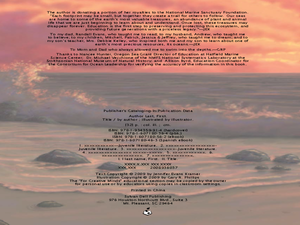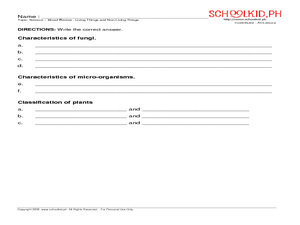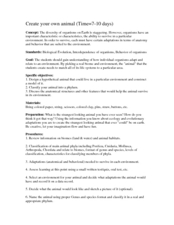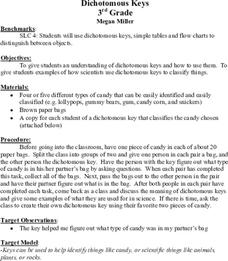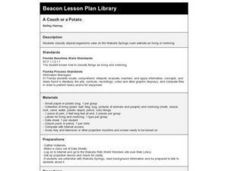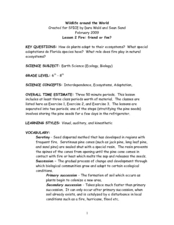Curated OER
Animal Hide and Seek
Learners read about animal camouflage. In this animal adaptation lesson, students read short texts about ways in which animals hide or transform to escape their prey. Learners explore animal classifications and determine ways to hide in...
Curated OER
Science - Mixed Review: Living Things and Non Living Things
For this living and non living things worksheet, students fill in a mixed review that has them answering questions in the true and false, short answer, and classification formats. Students answer 59 questions.
Curated OER
The Three Worm Phyla
Ninth graders examine the three worm phyla. In this classification instructional activity, 9th graders observe, compare and contrast the planarian, tapeworm, and fluke.
Curated OER
Create Your Own Animal
Students design and create their own hypothetical animal. In this biology lesson, students identify the factors organisms need to survive. They classify their animals according to its correct phylum.
Curated OER
Veterinarians (Community Helpers)
Students color animal pictures and make a class web chart about veterinarians to explore what a veterinarian does on a daily basis.
Curated OER
Dichotomous Keys
Third graders practice using dichotomous keys. They discover why scientists use them and why it is important to classify animals. They use candy to practice classifying objects and move on to classifying animals.
Curated OER
Sunflowers, The Circle of Life
Students investigate and observe plants and animals in nature. They find out how life cycles are present in much of nature. Students use appropriate graphic organizers for information gathering. Students use sequence life cycles of...
Curated OER
Finding Caterpillars
Pupils examine how animals protect themselves from predators and camouflage themselves. They participate in a simulation in which they locate red and green yarn "caterpillars," organize their data, and generate a bar graph using...
Curated OER
How Do Scientists Classify Organisms?
In this classification worksheet, students write in examples of the 6 kingdoms: archaebacteria, eubacteria, protists, fungi, plants, and animals. This worksheet is a graphic organizer.
Curated OER
Melts in Your Bag, Not in Your Hands
Students study how the sun transfers heat to the earth through radiation. They examine how animals absorb energy from the sun to warm their bodies by experiment with chocolate melting. They examine sun safety.
Curated OER
Centipede or Millipede?
Learners discuss millipedes and centipedes in terms of their classification as arthropod. Using a diagram, students categorize and compare and contrast the characteristics of millipedes and centipedes based on their discussion of...
Curated OER
Mollusks and Annelids
In this mollusks and annelids worksheet, students complete a crossword puzzle with 34 questions on the types and classification of mollusks.
Out of Africa Wildlife Park
A Thematic Learning Guide to Lions
Written as an accompaniment to a field trip to the Out of Africa Wildlife Park in Arizona, this is an interdisciplinary, themed lesson on lions. Even if you cannot take your upper-elementary kids to this attraction, there are a few...
Curated OER
Species Charades
Students identify endangered species. In this endangered species lesson, the teacher leads a discussion about endangered species, then the class plays a game of charades to pantomime animal behavior.
Curated OER
A Couch or a Potato
Students classify objects and organisms seen on the Wakulla Springs icam website as living or nonliving.
Curated OER
Cardboard Tree and Endangered Animals Lesson
Students create endangered animal figures and their habitats.
Curated OER
Life Has A History
In this biology instructional activity, students identify and match various classes of species found today. Then they explain why biodiversity exists today on earth and define evolution. Students also describe who a paleontologist is and...
Curated OER
Coral Reefs
Young scholars research an inhabitant of a Caribbean coral reef using a list of common organisms that live on or near it. Students then write a description of their organism and draw a picture or a 3-D model of it. Eventually they all...
Curated OER
A Little Horse Sense
How have horses evolved over time? How do horse skulls reveal this evolution? How have the roles horses play changed over time? What kind of social structure do horse herds have? How should wild horse populations be managed? To find the...
Curated OER
Create An Insect
Young scholars create a new species of insect. They create a list of insect characteristics and use this as a springboard to draw an insect of their own. Students write a brief descriptive paragraphs about their insect, giving...
Curated OER
Buzzing is BEE-lieving
Students investigate insects. In this insect lesson plan, students explore various insect models and identify the characteristics of each. Students observe insects outside and tally how many insects they observe.
Curated OER
A Wild Family Album!
Students create a scrapbook style family album for a selected animal. They complete an interactive Internet activity on research reports, fill out a graphic organizer, diagram a food web, and complete their scrapbook that includes...
Curated OER
Wildlife Around the World
Middle schoolers examine how plants are able to adapt to their ecosystem and the role that fire plays in changes through the years. In this ecosystem lesson students complete several exercises focussing on plants and their adaptations to.
Curated OER
Jane Goodall, Renowned Naturalist and Champion of Chimpanzees
Students study the life of Jane Goodall and how she made an impact studying chimpanzees. In this endangered species lesson students write in their journals.


